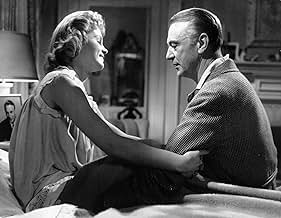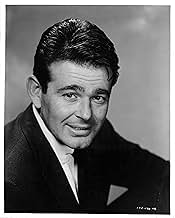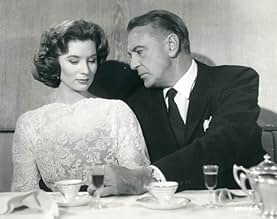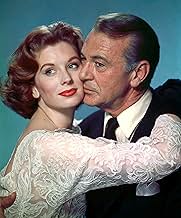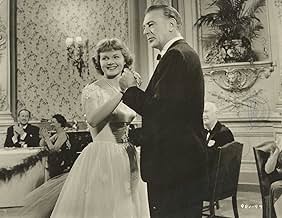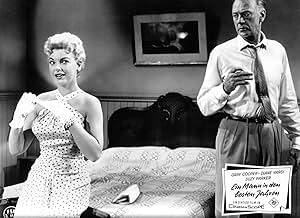PUNTUACIÓN EN IMDb
6,7/10
948
TU PUNTUACIÓN
En el funeral de su padre, Ann Chapin recuerda los últimos cinco años de su vida, años de aparente fracaso político y personal dominado por una esposa egoísta e insatisfecha y aliviados solo... Leer todoEn el funeral de su padre, Ann Chapin recuerda los últimos cinco años de su vida, años de aparente fracaso político y personal dominado por una esposa egoísta e insatisfecha y aliviados solo por el alcohol.En el funeral de su padre, Ann Chapin recuerda los últimos cinco años de su vida, años de aparente fracaso político y personal dominado por una esposa egoísta e insatisfecha y aliviados solo por el alcohol.
- Premios
- 1 premio y 1 nominación en total
Robert Adler
- Farmer
- (sin acreditar)
- …
John Alban
- Dinner Guest
- (sin acreditar)
Brandon Beach
- Dinner Guest
- (sin acreditar)
Melinda Byron
- Hope
- (sin acreditar)
Mary Carroll
- Nurse
- (sin acreditar)
Beulah Christian
- Nightclub Patron
- (sin acreditar)
Buck Class
- Bill
- (sin acreditar)
Reseñas destacadas
Gary Cooper made six films after "Ten North Frederick" -- and by the last one, "The Naked Edge," he was near death and filming had to be stopped frequently to give him oxygen.
Here, in a film based on a novel by John O'Hara, he plays Joseph Chapin, a lawyer with a son, Joby (Ray Stricklyn), a daughter,Ann (Diane Varsi) and an absolute shrew as a wife, Edith (Geraldine Fitzgerald). He's a gentle man, who has probably kept peace in his life by giving in to his wife.
The film begins with Joe's funeral, with his daughter Ann looking back on the last five years. Her own life has been affected by falling in love with a talented trumpet player (Stuart Whitman) and her ensuing unhappiness, and her brother wanted to study music at Juilliard but is pressured to attend law school. The war intervenes, and at the beginning of the film, he has returned for the funeral.
Edith has political ambitions and pushes Joe into throwing his hat in the ring; he soon finds it's too dirty a game for him and withdraws.
Joe, disillusioned, his beloved daughter having left home, he goes to New York to visit her and meets her gorgeous roommate (Suzy Parker). The two fall in love, despite their age difference.
I have to say, I felt the film was a little on the dull side - the pace was slow, and the acting, despite some of the comments here, I found rather dull. The thing about Gary Cooper is that he underplays and is very subtle - now, there's underplaying and there's just not acting. I have to say I didn't feel Diane Varsi did much acting here. Geraldine Fitzgerald was terrific, as was Ray Stricklyn, who went on to Broadway success and a huge career in publicity with the John Springer organization, handling people like Elizabeth Taylor and Bette Davis. Suzy Parker was always a total vision, but never much of an actress.
The most effective scenes were at the end of the movie, very beautiful and well worth waiting for. Cooper really shone throughout, but especially in the last section. A wonderful presence, and, like many stars of that era, we lost him too soon. It's sad to realize that they're all gone, including Varsi, who died at age 54.
Worth seeing for some of the performances. A little sharper direction would have brought it up a level.
Here, in a film based on a novel by John O'Hara, he plays Joseph Chapin, a lawyer with a son, Joby (Ray Stricklyn), a daughter,Ann (Diane Varsi) and an absolute shrew as a wife, Edith (Geraldine Fitzgerald). He's a gentle man, who has probably kept peace in his life by giving in to his wife.
The film begins with Joe's funeral, with his daughter Ann looking back on the last five years. Her own life has been affected by falling in love with a talented trumpet player (Stuart Whitman) and her ensuing unhappiness, and her brother wanted to study music at Juilliard but is pressured to attend law school. The war intervenes, and at the beginning of the film, he has returned for the funeral.
Edith has political ambitions and pushes Joe into throwing his hat in the ring; he soon finds it's too dirty a game for him and withdraws.
Joe, disillusioned, his beloved daughter having left home, he goes to New York to visit her and meets her gorgeous roommate (Suzy Parker). The two fall in love, despite their age difference.
I have to say, I felt the film was a little on the dull side - the pace was slow, and the acting, despite some of the comments here, I found rather dull. The thing about Gary Cooper is that he underplays and is very subtle - now, there's underplaying and there's just not acting. I have to say I didn't feel Diane Varsi did much acting here. Geraldine Fitzgerald was terrific, as was Ray Stricklyn, who went on to Broadway success and a huge career in publicity with the John Springer organization, handling people like Elizabeth Taylor and Bette Davis. Suzy Parker was always a total vision, but never much of an actress.
The most effective scenes were at the end of the movie, very beautiful and well worth waiting for. Cooper really shone throughout, but especially in the last section. A wonderful presence, and, like many stars of that era, we lost him too soon. It's sad to realize that they're all gone, including Varsi, who died at age 54.
Worth seeing for some of the performances. A little sharper direction would have brought it up a level.
A successful small-town lawyer (Gary Cooper) with a beautiful wife (Geraldine Fitzgerald), two over-achieving children, and aspirations to be president, seems to have it all. But as his daughter looks back on his life, a different man emerges: one in conflict with his ambitious and shrewish wife, terrified that the misdeeds of his children will dash his political dreams, and in love with a model half his age (Suzy Parker). With black wit and penetrating insight, as a portrait of the personal and political hypocrisy of mid-20th-century America Ten North Frederick stands much above Butterfield 8, Revolutionary Road, Mr. Bridge and Mrs. Bridge, though much beneath The Swimmer and Mad Men. Pretty competent drama extracted from John O'Hara. Certainly half-flawed. There is, for example, a flashback in which the character who remembers could not have previous knowledge of the remembered facts, which only the viewer knows.
"10 North Frederick" recounts the story of a middle aged man, successful in business, who is pushed into the political arena by his domineering, obnoxious wife.
Gary Cooper and Geraldine Fitzgerald are in fine form as the middle aged man and vicious wife. With the ending of his career approaching, Cooper gave an outstanding performance as a man who was just too good for the society that he lived in. Equally impressive was Geraldine Fitzgerald, his wife Edith, with her sterling political ambitions that could easily rival Mary Todd Lincoln. Erudite, yet a tramp in her own right, Fitzgerald etched an unforgettable character in using such terms as mawkish. (Fitzgerald could have easily played Mary Todd Lincoln in the great 1940 film "Abe Lincoln in Illinois if Ruth Gordon hadn't been available.) Some could call the film dated but what an impressive date! The mores of yesterday were defined that in politics, if you had a scandal in the family, you were ruined. Not so necessarily true today. The same more could be applied to older men married to younger women. Sociologists could really have a ball with this terrific film.
When he sees the dirt that politics brings, he begins an affair with his daughter's room mate. Diane Varsi, who was so good in "Peyton Place," shines as the daughter. Suzy Parker is her friend who has an affair with Cooper.
Fitzgerald pulls out all the stops in her vicious tirades. She is soon slapped down by her son who denounces her publicly for what she has done to her husband.
A wonderful film detailing moral values and their decline in a society where they are most needed. Highly recommended film to all viewers.
Gary Cooper and Geraldine Fitzgerald are in fine form as the middle aged man and vicious wife. With the ending of his career approaching, Cooper gave an outstanding performance as a man who was just too good for the society that he lived in. Equally impressive was Geraldine Fitzgerald, his wife Edith, with her sterling political ambitions that could easily rival Mary Todd Lincoln. Erudite, yet a tramp in her own right, Fitzgerald etched an unforgettable character in using such terms as mawkish. (Fitzgerald could have easily played Mary Todd Lincoln in the great 1940 film "Abe Lincoln in Illinois if Ruth Gordon hadn't been available.) Some could call the film dated but what an impressive date! The mores of yesterday were defined that in politics, if you had a scandal in the family, you were ruined. Not so necessarily true today. The same more could be applied to older men married to younger women. Sociologists could really have a ball with this terrific film.
When he sees the dirt that politics brings, he begins an affair with his daughter's room mate. Diane Varsi, who was so good in "Peyton Place," shines as the daughter. Suzy Parker is her friend who has an affair with Cooper.
Fitzgerald pulls out all the stops in her vicious tirades. She is soon slapped down by her son who denounces her publicly for what she has done to her husband.
A wonderful film detailing moral values and their decline in a society where they are most needed. Highly recommended film to all viewers.
John O'Hara's best selling novel, described by one critic as 'a brilliant portrait of the personal and political hypocrisy of mid-century America', has been adapted by one of cinema's finest screenplay writers Philip Dunne who also capably directs although he himself admitted that he had 'started directing too late'. Albeit truncated, this version apparently met with the approval of the author.
The political ambitions of leading character Joseph Chapin in the novel have been reduced here and Dunne has opted to develop a brief fling between middle-aged Chapin and Kate Drummond, a woman half his age, into a full blown romance. It must be said that the beautifully understated and sensitive playing of Gary Gooper and lovely Suzy Parker has resulted in one of the most moving and heartbreaking Spring/Autumn affairs ever committed to celluloid.
By all accounts Mr. Cooper jumped at the chance to play the part originally turned down by Spencer Tracy and would no doubt have identified with his character as he had earlier called off his relationship with Patricia Neal and returned to his wife who was hopefully more forgiving that his spouse in this, played by the superlative Geraldine Fitzgerald. There were also distinct echoes of Diane Varsi's own life in her role of Chapin's daughter, having come from a broken home and been twice divorced by the age of twenty one. This talented but fragile artiste suffered a breakdown during filming and was later to quit Fox studios as she felt she was 'heading for destruction'.
Great support from John Emery, Philip Ober, the ill-fated Tom Tully and the inimitable Barbara Nicholls as a party girl. There is a splendid score by Leigh Harline but the confounded Cinemascope format alas proves itself once again totally unsuited to intimacy. The phrase 'they don't make them like that anymore' is used to describe the character of Joe Chapin. It might just as easily refer to Gary Cooper.
The disillusionment, regret and sense of failure depicted here cannot fail to strike a chord with most of us and call to mind Whittier's 'Of all the sad words of tongue or pen, the saddest are these: it might have been.'
The political ambitions of leading character Joseph Chapin in the novel have been reduced here and Dunne has opted to develop a brief fling between middle-aged Chapin and Kate Drummond, a woman half his age, into a full blown romance. It must be said that the beautifully understated and sensitive playing of Gary Gooper and lovely Suzy Parker has resulted in one of the most moving and heartbreaking Spring/Autumn affairs ever committed to celluloid.
By all accounts Mr. Cooper jumped at the chance to play the part originally turned down by Spencer Tracy and would no doubt have identified with his character as he had earlier called off his relationship with Patricia Neal and returned to his wife who was hopefully more forgiving that his spouse in this, played by the superlative Geraldine Fitzgerald. There were also distinct echoes of Diane Varsi's own life in her role of Chapin's daughter, having come from a broken home and been twice divorced by the age of twenty one. This talented but fragile artiste suffered a breakdown during filming and was later to quit Fox studios as she felt she was 'heading for destruction'.
Great support from John Emery, Philip Ober, the ill-fated Tom Tully and the inimitable Barbara Nicholls as a party girl. There is a splendid score by Leigh Harline but the confounded Cinemascope format alas proves itself once again totally unsuited to intimacy. The phrase 'they don't make them like that anymore' is used to describe the character of Joe Chapin. It might just as easily refer to Gary Cooper.
The disillusionment, regret and sense of failure depicted here cannot fail to strike a chord with most of us and call to mind Whittier's 'Of all the sad words of tongue or pen, the saddest are these: it might have been.'
About 15 years ago my daughter (about 13 at the time) and I were surfing channels and got in on the last 30 or 45 minutes of this movie. WOW, I had to own it and finally found it on VHS. A wonderful movie. One of my favorites of this genre.
And Gary Cooper had his own style. This was a bit unlike his other... But he played it to a T... Cooper was a gentleman, and his wife an overbearing witch. His failures result from his being too nice of a guy to make him into the man she wanted him to be. It was wonderful that his daughter found out that he had been happy. And even in that happiness he was still a gentleman.
And Gary Cooper had his own style. This was a bit unlike his other... But he played it to a T... Cooper was a gentleman, and his wife an overbearing witch. His failures result from his being too nice of a guy to make him into the man she wanted him to be. It was wonderful that his daughter found out that he had been happy. And even in that happiness he was still a gentleman.
¿Sabías que...?
- CuriosidadesSpencer Tracy was originally cast in the lead role, but withdrew due to ill health and concerns over the ability of co-star Suzy Parker. Tracy told reporters in November 1957 he had withdrawn from this film to star in El último hurra (1958).
- PifiasIn the opening sequence, which is supposed to be taking place in 1945, a 1950 Lincoln Cosmopolitan prominently pulls up in front of the house.
- Citas
Stella: You're hurtin' my arm.
Joseph B. 'Joe' Chapin: I frequently hurt people without meaning to. It's my specialty.
- ConexionesFeatured in El secreto de los Abbott (1997)
- Banda sonoraOn the Atchison, Topeka and the Santa Fe
(uncredited)
Music by Harry Warren
Played on the phonograph in Joby's room
Selecciones populares
Inicia sesión para calificar y añadir a tu lista para recibir recomendaciones personalizadas
Detalles
- Duración
- 1h 42min(102 min)
- Color
- Mezcla de sonido
- Relación de aspecto
- 2.35 : 1
Contribuir a esta página
Sugerir un cambio o añadir el contenido que falta

